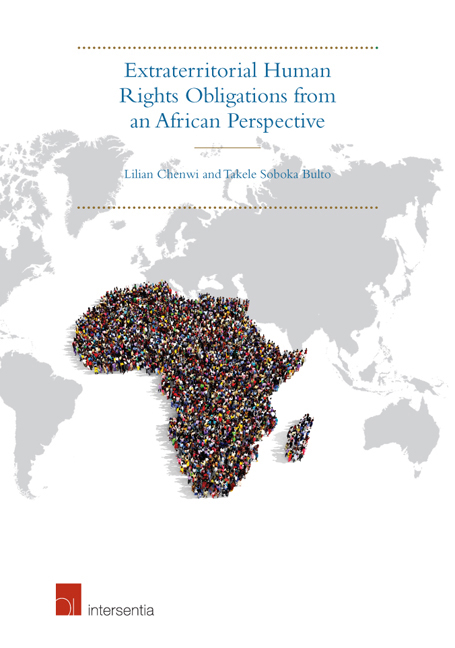Book contents
- Frontmatter
- Dedication
- Foreword
- Preface
- Contents
- List of Cases, Advisory Opinions and Other Decisions
- List of Treaties and Other Instruments
- About the Contributors
- Introduction
- Extraterritoriality in the African Regional Human Rights System from a Comparative Perspective
- Commercialisation of Educational Services and Extraterritorial Human Rights Obligations
- Extraterritorial Human Rights Obligations in the Context of Development Assistance to African States
- The Right to Food Beyond Borders: The Extraterritorial Reach of the Right to Food in Africa
- Extraterritorial Application of the Right to Water under the African System for the Protection of Human Rights
- Tortured Unity: United States–Africa Relations in Extraordinary Renditions and States’ Extraterritorial Obligations
- Indigenous Communities Displaced by Climate Change and Extraterritorial Application of States’ Obligations in Africa
- Land Grabbing, Extraterritorial Obligations and the Failure of Justice in Uganda: The Mubende Case
- Extraterritorial Obligations of Uganda for its Military's Failure to Respect and Protect Civilians in Areas of the Lord's Resistance Army Activity
- Bibliography
- Index
Tortured Unity: United States–Africa Relations in Extraordinary Renditions and States’ Extraterritorial Obligations
Published online by Cambridge University Press: 21 September 2018
- Frontmatter
- Dedication
- Foreword
- Preface
- Contents
- List of Cases, Advisory Opinions and Other Decisions
- List of Treaties and Other Instruments
- About the Contributors
- Introduction
- Extraterritoriality in the African Regional Human Rights System from a Comparative Perspective
- Commercialisation of Educational Services and Extraterritorial Human Rights Obligations
- Extraterritorial Human Rights Obligations in the Context of Development Assistance to African States
- The Right to Food Beyond Borders: The Extraterritorial Reach of the Right to Food in Africa
- Extraterritorial Application of the Right to Water under the African System for the Protection of Human Rights
- Tortured Unity: United States–Africa Relations in Extraordinary Renditions and States’ Extraterritorial Obligations
- Indigenous Communities Displaced by Climate Change and Extraterritorial Application of States’ Obligations in Africa
- Land Grabbing, Extraterritorial Obligations and the Failure of Justice in Uganda: The Mubende Case
- Extraterritorial Obligations of Uganda for its Military's Failure to Respect and Protect Civilians in Areas of the Lord's Resistance Army Activity
- Bibliography
- Index
Summary
INTRODUCTION
One of the most important achievements of twentieth-century international human rights norms codification and treaty-making is the development of a universal, unanimous, non-derogable norm prohibiting torture. The absolute denunciation and prohibition of torture has become a subject of universal consensus in the international community, since its practice is irreconcilably opposed to the very idea of fundamental respect and dignity of the human person that the Charter of the United Nations of 1945 (UN Charter) proclaimed as constitution of the global community. However, the so-called’ war on terror’ that has been waged by the United States (US) post-11 September 2001 (post-9/11) has threatened, in more ways than one, to reverse one of the greatest achievements of twentieth-century human rights norms-making.
The post-9/11 world saw states of all continents and political orientations resort to the use of torture against suspected terrorists as a routine means of interrogation. The so-called’ enhanced’ interrogations take place at some’ black sites’ usually managed and operated by the US Central Intelligence Agency (CIA). These sites, some of which are located in Africa, are always based outside the territorial jurisdiction of the US.
Pressure from the US on the relatively weak African states induced – usually by means of economic or military aid – some African states to embrace the antiterrorism rhetoric and practice, most importantly through their participation in the CIA's’ extraordinary rendition’ programme. The relative lack of power in the face of CIA demands for cooperation in extraordinary rendition means that African states have been either coerced into compliance or acquiesced in the CIA's counter-terrorism processes of capture, rendition and interrogation. This has triggered conformity on the part of African states, who have adopted domestic legislation that was otherwise not on their agenda, in order to share intelligence and crack down on target groups. Some of this legislation has since become a means for African states to detain and torture innocent citizens, particularly domestic human rights activists, political opponents, and members of local Muslim communities, and to establish or expand local’ mini-Guantanamo-Bay’ maximum security detention and torture centres.
- Type
- Chapter
- Information
- Publisher: IntersentiaPrint publication year: 2018



